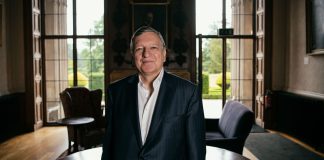Before launching the computer software company that made him a millionaire, renowned investor Mark Cuban thought a different business idea would be his runaway hit.
At age 24, prior to creating his software startup MicroSolutions, Cuban decided to sell powdered milk as a recent college graduate eager to strike out on his own. He had very little cash on hand, the now 66-year-old tells CNBC Make It: “Less than $20.”
His stint as a powdered milk salesman lasted just about 30 days before he threw in the towel. Luckily for him, he didn’t have much money invested in the venture — “just enough to buy samples and realize no one wanted to buy them,” he says.
During that month, Cuban pitched his product to anyone who’d listen, he told serial entrepreneur Emma Grede on a July 15 episode of her “Aspire” podcast. “I remember taking samples to people, mixing it up like, ‘Look, milk’s expensive. We’re broke, right? This will save you money,” he said. “And just seeing the look on their face … Point taken.”
Cuban considered his product cost-effective, but “it did not sell,” he added.
Shortly after that, he launched MicroSolutions and, at age 32, sold that business to CompuServe for $6 million in 1990. Less than 10 years later, his second venture, audio streaming service Broadcast.com, sold to Yahoo for $6 billion. His estimated net worth is now $6 billion, according to Forbes.
Powdered milk may not have been lucrative, but the foray taught him a valuable lesson about failure, he told Grede: “[It] doesn’t matter how many times you fail. You only have to be right one time. Just one time.’
How to start a successful business with $0
If you don’t have the money to get your business idea off the ground, Cuban has one piece of advice for you: Go all in on sweat equity.
“First, you’ve got to find the right product or service,” he said on the podcast. “If you don’t have any money, most likely [your business] is going to be a service.”
Think of something you do well, and a need that other people have, and combine the two, he said. This could include tutoring, freelance writing or graphic design, dog walking or social media management, for example.
CNBC Make It has spoken with a variety of entrepreneurs who’ve found lucrative ways to use their talents with little-to-no upfront investment, from Derrick Morgan Jr. — an Indianapolis-based lawyer who created a Covid-era side hustle offering his expertise in filing trademarks on gig platform Fiverr — to Jean Kang, a former big-tech program manager who brought in about $20,000 per month in 2024 as a LinkedIn content creator and career coach.
If Cuban had to start a new business without any money today, he’d focus on artificial intelligence, he said — using free AI chatbots to sharpen his prompt engineering skills, and then teaching small-business owners how to use the technology to boost their profitability.
“If I was broke, sleeping on the floor again, I’d be all about AI,” said Cuban. “If I had access to a library and $0, I would be all about AI. I’d be in there till they kicked me out.”
Want to stand out, grow your network, and get more job opportunities? Sign up for Smarter by CNBC Make It’s new online course, How to Build a Standout Personal Brand: Online, In Person, and At Work. Learn from three expert instructors how to showcase your skills, build a stellar reputation, and create a digital presence that AI can’t replicate. Sign up today with coupon code EARLYBIRD for an introductory discount of 30% off the regular course price of $67 (plus tax). Offer valid July 22, 2025, through September 2, 2025.
Plus, sign up for CNBC Make It’s newsletter to get tips and tricks for success at work, with money and in life, and request to join our exclusive community on LinkedIn to connect with experts and peers.
Great Job & the Team @ NBC 5 Dallas-Fort Worth Source link for sharing this story.




